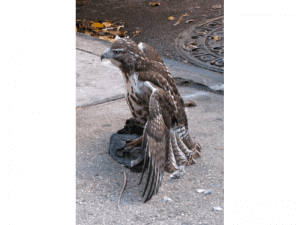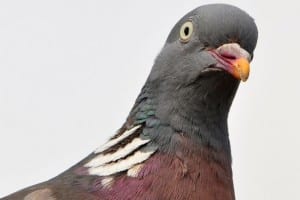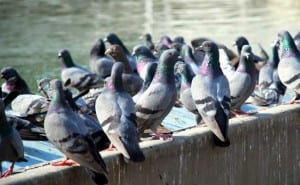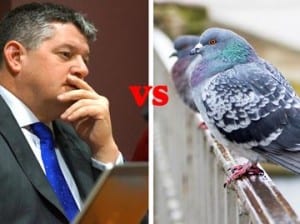
by Pigeon Patrol | Jan 28, 2016 | 4-S Gel Bird repellent, Bird Netting, Pigeons in the News
 Farmers cultivating fruits like grapes on ‘pandal’ are advised to erect anti-bird nets with subsidy under the National Horticulture Mission to protect the fruits from birds, squirrels, owls, etc., as the netting protects the crops from extensive damage to fruits and vegetables.
Farmers cultivating fruits like grapes on ‘pandal’ are advised to erect anti-bird nets with subsidy under the National Horticulture Mission to protect the fruits from birds, squirrels, owls, etc., as the netting protects the crops from extensive damage to fruits and vegetables.
Anti-bird netting is an effective method for preventing crop loss usually caused by birds that invade the vineyards in flocks. Anti-bird netting can be done manually or mechanically depending upon the need. The anti-bird nets can also be used for holding animals in an enclosure, thus preventing any pillaging by birds and in some instances for keeping wild animals out and preventing consequent damage. With regard to aviary protection, wide-meshed nets are recommended.
Plastic anti-bird netting is a light weight but strong netting that will protect soft fruits and vegetables from bird attacks and browsing animals. Anti-bird netting can be used for fruit cages, protection of crops from birds, rabbits, squirrels and other similar pests, he added.
The plastic bird netting is lightweight, easy to handle and simple to install over fruit cages, directly over fruit trees and on vegetable or fruit growing areas.
The netting apertures allow smaller essential pollinating insects through and smaller butterflies while preventing birds. Anti-bird nets have a rectangular structure which creates a strong plastic mesh structure, making it easier to install and long lasting than the diamond mesh structured plastic bird netting.
Inspecting a field with anti-bird netting protection at Krishnapuram in the district, S. Raja Mohamed, Deputy Director of Horticulture, said 50 percent subsidy at the rate of Rs. 17.50 per sq.m. limited to 5,000 sq.m. per beneficiary was being given under the NHM to the farmers, who needed anti-bird nets.
As a promotional measure during the current fiscal, 1,000 sq.m. had been allotted to P. Ravichandran of Krishnapuram under this component with an allocation of Rs. 17,500.
“Farmers cultivating fruits like grapes and vegetables grown on ‘pandal’ may go for anti-bird netting with the NHM subsidy. While this effort fetches sizable assistance, the yield is also increased substantially by preventing invading birds and smaller animals,” Mr. Raja Mohamed said.
About Pigeon Patrol:
Pigeon Patrol Products & Services is the leading manufacturer and distributor of bird deterrent (control) products in Canada. Pigeon Patrol products have solved pest bird problems in industrial, commercial, and residential settings since 2000, by using safe and humane bird deterrents with only bird and animal friendly solutions. At Pigeon Patrol, we manufacture and offer a variety of bird deterrents, ranging from Ultra-flex Bird Spikes with UV protection, Bird Netting, 4-S Gel and the best Ultrasonic and audible sound devices on the market today.
Voted Best Canadian wholesaler for Bird Deterrent products four years in a row.
Contact Info: 1- 877– 4– NO-BIRD (www.pigeonpatrol.ca)

by Pigeon Patrol | Jan 27, 2016 | Bird Netting, Pigeon Patrol's Services, Pigeon Spikes
 Some very interesting new research has uncovered something remarkable about pigeons. Apparently, they can learn much like a human.
Some very interesting new research has uncovered something remarkable about pigeons. Apparently, they can learn much like a human.
“The research shows the mechanisms by which children learn words might not be unique to humans,” comments study author Bob McMurray, of the University of Iowa. “Children are confronted with an immense task of learning thousands of words without a lot of background knowledge to go on. For a long time, people thought that such learning is special to humans.”
McMurray goes on to say, “What this research shows is that the mechanisms by which children solve this huge problem may be mechanisms that are shared with many species.”
Obviously, a pigeon does not have the same capacity for information as a human, but the study suggest that they have, at least, comparable capacity for learning.
“It is certainly no simple task to investigate animal cognition; but, as our methods have improved, so too have our understanding and appreciation of animal intelligence,” explains study author Ed Wasserman, of the University of Iowa. “Differences between humans and animals must indeed exist, many are already known. But, they may be outnumbered by similarities. Our research on categorization in pigeons suggests that those similarities may even extend to how children learn words,”
He presents hypotheticals: “Would children learn faster than pigeons? Almost certainly; However, our pigeons came to the experiment with literally no background knowledge. They did not understand the nature of the ‘task’ they had not encountered these categories before, and they had empty lexicons.”
“Children, on the other hand, bring all of these things to bear on the problem of learning words,” he says. “Thus, the more relevant comparison group may be newborn infants, who indeed take 6 to 9 months to learn their first words.”
About Pigeon Patrol:
Pigeon Patrol Products & Services is the leading manufacturer and distributor of bird deterrent (control) products in Canada. Pigeon Patrol products have solved pest bird problems in industrial, commercial, and residential settings since 2000, by using safe and humane bird deterrents with only bird and animal friendly solutions. At Pigeon Patrol, we manufacture and offer a variety of bird deterrents, ranging from Ultra-flex Bird Spikes with UV protection, Bird Netting, 4-S Gel and the best Ultrasonic and audible sound devices on the market today.
Voted Best Canadian wholesaler for Bird Deterrent products four years in a row.
Contact Info: 1- 877– 4– NO-BIRD (www.pigeonpatrol.ca)

by Pigeon Patrol | Jan 26, 2016 | Bird Netting, Pigeon Spikes
 Two Aeroflot jets collided with birds in the past 24 hours, but no one was injured.
Two Aeroflot jets collided with birds in the past 24 hours, but no one was injured.
The pilots of an Airbus A-330 radioed air traffic controllers shortly after taking off from Moscow’s Sheremetyevo Airport on a flight to London to say that they had struck a large bird, Interfax reported Thursday.
“Nonetheless, the crew decided to continue the flight,” an official in Moscow’s air traffic control was quoted as saying.
The plane departed Moscow at 8:45 p.m. Wednesday. No serious damage was discovered to the aircraft after it safely landed in Heathrow.
The report did not say how many people were aboard the jet, which typically can carry 250-300 passengers.
The second bird strike occurred as an Airbus A-321 flight from Moscow was preparing to land at the Kaliningrad airport at 3:40 p.m. Wednesday. The bird hit the cockpit’s windshield, Moscow’s air traffic control said, without elaborating on whether the windshield was damaged.
Interfax did not say how many people were on the flight.
About Pigeon Patrol:
Pigeon Patrol Products & Services is the leading manufacturer and distributor of bird deterrent (control) products in Canada. Pigeon Patrol products have solved pest bird problems in industrial, commercial, and residential settings since 2000, by using safe and humane bird deterrents with only bird and animal friendly solutions. At Pigeon Patrol, we manufacture and offer a variety of bird deterrents, ranging from Ultra-flex Bird Spikes with UV protection, Bird Netting, 4-S Gel and the best Ultrasonic and audible sound devices on the market today.
Voted Best Canadian wholesaler for Bird Deterrent products four years in a row.
Contact Info: 1- 877– 4– NO-BIRD (www.pigeonpatrol.ca)

by Pigeon Patrol | Jan 25, 2016 | Bird Deterrent Products, Bird Netting
 March 2, 2015 — A READER ASKS: I live in a midsize co-op in Brooklyn. We have a huge pigeon problem. There are pigeon droppings everywhere. It’s not just unsightly; there’s so much of it now that I’m concerned about it becoming a health hazard. As far as anyone can tell, nobody in the building seems to be feeding them — we do have a policy in place against doing so. But is there anything the building can do to fix this problem and make the pigeons go away?
March 2, 2015 — A READER ASKS: I live in a midsize co-op in Brooklyn. We have a huge pigeon problem. There are pigeon droppings everywhere. It’s not just unsightly; there’s so much of it now that I’m concerned about it becoming a health hazard. As far as anyone can tell, nobody in the building seems to be feeding them — we do have a policy in place against doing so. But is there anything the building can do to fix this problem and make the pigeons go away?
HABITAT ANSWERS: Pigeons find window ledges, rooftops, bridges, and warehouses to be ideal substitutes for the natural ledges in cliff sides that they have always used as roosting, nesting and sheltering sites. The good news is that there are some simple things that co-ops and condos can do to keep birds from their buildings — and the best part is that they are humane.
Stop Feeding the Pigeons
It’s good that nobody in your building seems to be feeding the pigeons, but that doesn’t mean that the building is not unintentionally doing so. Pigeons are going to hang around places where they can help themselves to discarded food and even crumbs. Keep the sidewalk clean and outdoor garbage tidy. Cleaning regularly will help discourage pigeons from gathering and setting up nests in your building.
Prevent Roosting and Nesting
Pigeons look for flat surfaces for roosting and nesting, so the building has to take steps to make flat surfaces unavailable to them. With the correct application of the right product, roosting structures can be rendered virtually pigeon-free. There are a variety of devices that can be used to change flat nesting spots into inaccessible spaces and prevent pigeons from roosting in areas where they’re not wanted.
The Humane Society recommends the following products, all of which can be ordered from birdbarrier.com or 800-NO-BIRDS.com:
Attach wood or metal sheathing (Birdslides) at a 45- to 60-degree angle over window ledges and other flat surfaces to keep pigeons from landing.
Install “bird wires” to keep pigeons off ledges, railings, awnings, and rooftops.
Where the problem is more serious, consider using strips that give mild electric shocks.
Use netting to keep pigeons out of large areas.
Netting is probably your building’s best bet — it’s not only humane and effective but also a lot more cost effective.
Never use polybutylene gel, adds the Humane Society. Sticky gel repellents made from polybutene can harm all birds and any animal that comes in contact with it. The HSUS strongly recommends that these dangerous repellents be avoided at all costs. The feathers of any bird that comes into contact with the dense, sticky gel will become damaged, interfering with their ability to fly and to stay water-proofed. These gel repellents are not selective. Other birds are likely to land on the gel, get stuck, and die. The polybutene gels are particularly harmful to smaller species.
Planned Pigeonhood?
As year-round nesters, a pair of pigeons can raise a dozen or more young each year. If pigeons have plenty of food and space, their numbers can quickly increase. Fortunately, a bird contraceptive is available that limits growth of pigeon flocks. Ovocontrol bird food is “birth control” for pigeons. Innolytics, LLC
Known as OvoControl, pigeon contraception comes in the form of a kibble-type food, which causes birds that eat it regularly to lay eggs that fail to develop. Combined with exclusion and other humane measures to discourage roosting and nesting, OvoControl effectively reduces hatching rates in pigeons, thereby limiting flock sizes and diminishing problems associated with large numbers of pigeons.
Talk to Your Property Manager
Whatever you do, and regardless of how frustrating the problem, do not resort to poisoning them. In New York, it’s illegal to kill pigeons. Your property manager can suggest viable options for your building and then present those to the board for a final decision. Your board should be involved in addressing any bird-related problems, because the solution will usually affect the building’s exterior.
About Pigeon Patrol:
Pigeon Patrol Products & Services is the leading manufacturer and distributor of bird deterrent (control) products in Canada. Pigeon Patrol products have solved pest bird problems in industrial, commercial, and residential settings since 2000, by using safe and humane bird deterrents with only bird and animal friendly solutions. At Pigeon Patrol, we manufacture and offer a variety of bird deterrents, ranging from Ultra-flex Bird Spikes with UV protection, Bird Netting, 4-S Gel and the best Ultrasonic and audible sound devices on the market today.
Voted Best Canadian wholesaler for Bird Deterrent products four years in a row.
Contact Info: 1- 877– 4– NO-BIRD (www.pigeonpatrol.ca)

by Pigeon Patrol | Jan 24, 2016 | 4-S Gel Bird repellent, Bird Netting
 Pigeons never seem to crash. While their less-fortunate cousins occasionally take down airplanes, the humble city pigeon darts between lampposts, dodges skyscrapers and dips around oncoming traffic with ease. Now scientists have captured some of that action on film—and figured out how pigeons manage to squeeze through particularly tight spaces.
Pigeons never seem to crash. While their less-fortunate cousins occasionally take down airplanes, the humble city pigeon darts between lampposts, dodges skyscrapers and dips around oncoming traffic with ease. Now scientists have captured some of that action on film—and figured out how pigeons manage to squeeze through particularly tight spaces.
Pigeons need to strike the perfect balance between safe and efficient flight. When maneuvering between two poles, for instance, they can choose to either raise their wings upward in a mid-flap pause, or fold their wings inward. The so-called “wing-pause” is the more efficient method — it costs very little energy and results in almost no altitude loss. Meanwhile, the “wing-fold” position saps more energy and loses more altitude, but it’s easily the safest way to protect delicate wings from an unforgiving lamppost.
After training four pigeons to fly back and forth across a flight corridor, scientists dropped obstacles into their flight paths to test whether each bird would use the wing-pause or wing-fold maneuver. When it came to tight spaces, the scientists found that the birds favored the less efficient wing-fold maneuver — presumably because, in those situations, there was a high probability of ramming into a pole. But for larger gaps (12 inches, or about half a wingspan), the pigeons were less concerned about a collision, and chose the riskier but lower energy wing-pause maneuver. From the paper:
The choice between these two postures seems mediated by an element of caution or uncertainty…the efficient flight strategy is chosen where gaps are wider and there is less chance of a collision occurring.
The findings may explain why, despite the millions of pigeons in New York City, we rarely see them smash into cars or telephone poles. Beyond that the research suggests that some birds tune their flight strategies, rapidly weighing the odds of making it through a narrow pass.
About Pigeon Patrol:
Pigeon Patrol Products & Services is the leading manufacturer and distributor of bird deterrent (control) products in Canada. Pigeon Patrol products have solved pest bird problems in industrial, commercial, and residential settings since 2000, by using safe and humane bird deterrents with only bird and animal friendly solutions. At Pigeon Patrol, we manufacture and offer a variety of bird deterrents, ranging from Ultra-flex Bird Spikes with UV protection, Bird Netting, 4-S Gel and the best Ultrasonic and audible sound devices on the market today.
Voted Best Canadian wholesaler for Bird Deterrent products four years in a row.
Contact Info: 1- 877– 4– NO-BIRD (www.pigeonpatrol.ca)

 Farmers cultivating fruits like grapes on ‘pandal’ are advised to erect anti-bird nets with subsidy under the National Horticulture Mission to protect the fruits from birds, squirrels, owls, etc., as the netting protects the crops from extensive damage to fruits and vegetables.
Farmers cultivating fruits like grapes on ‘pandal’ are advised to erect anti-bird nets with subsidy under the National Horticulture Mission to protect the fruits from birds, squirrels, owls, etc., as the netting protects the crops from extensive damage to fruits and vegetables.

 Some very interesting new research has uncovered something remarkable about pigeons. Apparently, they can learn much like a human.
Some very interesting new research has uncovered something remarkable about pigeons. Apparently, they can learn much like a human.
 Two Aeroflot jets collided with birds in the past 24 hours, but no one was injured.
Two Aeroflot jets collided with birds in the past 24 hours, but no one was injured.
 March 2, 2015 — A READER ASKS: I live in a midsize co-op in Brooklyn. We have a huge pigeon problem. There are pigeon droppings everywhere. It’s not just unsightly; there’s so much of it now that I’m concerned about it becoming a health hazard. As far as anyone can tell, nobody in the building seems to be feeding them — we do have a policy in place against doing so. But is there anything the building can do to fix this problem and make the pigeons go away?
March 2, 2015 — A READER ASKS: I live in a midsize co-op in Brooklyn. We have a huge pigeon problem. There are pigeon droppings everywhere. It’s not just unsightly; there’s so much of it now that I’m concerned about it becoming a health hazard. As far as anyone can tell, nobody in the building seems to be feeding them — we do have a policy in place against doing so. But is there anything the building can do to fix this problem and make the pigeons go away?
 Pigeons never seem to crash. While their less-fortunate cousins occasionally take down airplanes, the humble city pigeon darts between lampposts, dodges skyscrapers and dips around oncoming traffic with ease. Now scientists have captured some of that action on film—and figured out how pigeons manage to squeeze through particularly tight spaces.
Pigeons never seem to crash. While their less-fortunate cousins occasionally take down airplanes, the humble city pigeon darts between lampposts, dodges skyscrapers and dips around oncoming traffic with ease. Now scientists have captured some of that action on film—and figured out how pigeons manage to squeeze through particularly tight spaces.